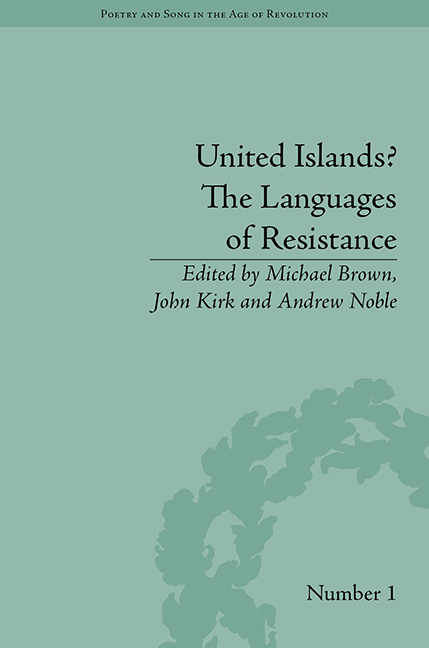Book contents
- Frontmatter
- CONTENTS
- Acknowledgements
- List of Figures and Tables
- List of Contributors
- Introduction: The Languages of Resistance: National Particularities, Universal Aspirations
- 1 Reading the English Political Songs of the 1790s
- 2 Why should the Landlords have the Best Songs? Thomas Spence and the Subversion of Popular Song
- 3 ‘Bard of Liberty’: Iolo Morganwg, Wales and Radical Song
- 4 Canonicity and Radical Evangelicalism: The Case of Thomas Kelly
- 5 Charlotte Brooke's Reliques of Irish Poetry: Eighteenth-Century ‘Irish Song’ and the Politics of Remediation
- 6 Homology, Analogy and the Perception of Irish Radicalism
- 7 Lost Manuscripts and Reactionary Rustling: Was there a Radical Scottish Gaelic Poetry between 1770 and 1820?
- 8 Virile Vernaculars: Radical Sexuality as Social Subversion in Irish Chapbook Verse, 1780–1820
- 9 Thomas Moore and the Problem of Colonial Masculinity in Irish Romanticism
- 10 Radical Politics and Dialect in the British Archipelago
- 11 ‘Theaw Kon Ekspect No Mooar Eawt ov a Pig thin a Grunt’: Searching for the Radical Dialect Voice in Industrial Lancashire and the West Riding, 1798–1819
- Afterword: The Languages of Resistance
- Notes
- Works Cited
- Index
9 - Thomas Moore and the Problem of Colonial Masculinity in Irish Romanticism
- Frontmatter
- CONTENTS
- Acknowledgements
- List of Figures and Tables
- List of Contributors
- Introduction: The Languages of Resistance: National Particularities, Universal Aspirations
- 1 Reading the English Political Songs of the 1790s
- 2 Why should the Landlords have the Best Songs? Thomas Spence and the Subversion of Popular Song
- 3 ‘Bard of Liberty’: Iolo Morganwg, Wales and Radical Song
- 4 Canonicity and Radical Evangelicalism: The Case of Thomas Kelly
- 5 Charlotte Brooke's Reliques of Irish Poetry: Eighteenth-Century ‘Irish Song’ and the Politics of Remediation
- 6 Homology, Analogy and the Perception of Irish Radicalism
- 7 Lost Manuscripts and Reactionary Rustling: Was there a Radical Scottish Gaelic Poetry between 1770 and 1820?
- 8 Virile Vernaculars: Radical Sexuality as Social Subversion in Irish Chapbook Verse, 1780–1820
- 9 Thomas Moore and the Problem of Colonial Masculinity in Irish Romanticism
- 10 Radical Politics and Dialect in the British Archipelago
- 11 ‘Theaw Kon Ekspect No Mooar Eawt ov a Pig thin a Grunt’: Searching for the Radical Dialect Voice in Industrial Lancashire and the West Riding, 1798–1819
- Afterword: The Languages of Resistance
- Notes
- Works Cited
- Index
Summary
Discussions of Irish Romanticism and gender have to date largely focussed on femininity, especially, for instance, in the recovery and canonization of such women writers as Maria Edgeworth and Lady Morgan, but also in discussions of Thomas Moore's depiction of women and orientalist representations of feminized men. But this focus on one pole of the binary construction of gender has occluded the problem of colonial masculinity in the decades after the Act of Union (1800) abolished the Irish parliament and with it the vestiges of official Irish sovereignty. Ireland was instead to be ruled from the British parliament with a newly added block of Irish seats, no longer to be governed (even nominally) through a native institution that might be reformed to include Catholic men — and decisively alienating the men of the Irish ruling class from the nation-state. This political sea-change is contemporary with a broad shift in literary writing about the nation that generally follows generic lines. In the 1790s, there was an ongoing radical project, led largely by the United Irishmen, to educate and involve the lower classes in political life, particularly through songbooks and affordable newspapers with political content; the United Irishmen also argued for an end to the Penal Laws which disadvantaged Catholics and Dissenters, and some of their materials were pitched at breaking down the linguistic divide in Ireland. The nationalist songs of the radical 1790s, disseminated particularly through the songbooks known as Paddy's Resource (published from 1795 to about 1803), invoked Thomas Paine and condemned Edmund Burke, generally featured lower-class (often bilingual) speakers, and circulated popularly through print and oral culture.
- Type
- Chapter
- Information
- United Islands?The Languages of Resistance, pp. 153 - 166Publisher: Pickering & ChattoFirst published in: 2014



